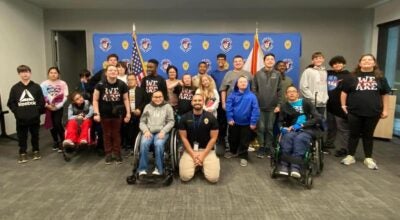Ham radio demonstrates emergency response
Published 2:08 pm Friday, June 19, 2009
When the usual means of communications overload during a crisis, amateur radio operators come to the rescue, often saving lives and property.
Amateur, or ham, radio operators across the country will demonstrate these emergency capabilities at their 77th annual Field Day on June 27 and 28. Last year, more than 30,000 operators participated in the event.
Four hundred ham radio operators reside in Shelby County, many of whom will participate in Field Day.
“We’re self-contained, meaning we carry our own equipment and power supplies and aren’t dependent on infrastructure,” said Rod Scott, a Field Day organizer. “Also, we’re frequency-agile, so if one frequency isn’t working, we can change frequencies to make contact.”
During Hurricane Katrina in 2005, ham radio operators provided a reliable means of communication by sending messages without using phone lines or the internet, Scott said.
Les Rayburn, who handles amateur radio emergency response in Alabama, traveled to Mobile 15 hours after Hurricane Katrina made landfall. He spent seven weeks on the Gulf Coast responding to disasters until long after Hurricane Rita hit.
On one mission, Rayburn helped locate a group of AT&T technicians and notified Washington when they were found. Another time, they responded to Port Arthur, Texas, when the city had lost its public safety communications like EMS, police and fire and set up temporary amateur radio.
“I was one of the first federal responders to Cameron, La., and we obtained navy helicopter so that they could search for citizens that were missing,” Rayburn said.
The Shelby County Amateur Radio Club will hold its Field Day at the Emergency Management Agency in Columbiana. Anyone can attend to meet the operators and learn how to get a radio license.
The Field Day event is part contest, part demonstration, Scott said. Participating ham radio operators have 24 hours to make contact with any station across the U.S. and in surrounding countries.
Operators log the call sign of each station they contact so that points can be calculated. In past years, operators have received more points for contacting stations using alternative energy sources, such as solar power, Scott said.
Within six months, the operators will be ranked with others across the nation.
Scott said he encourages anyone to get licensed as a ham radio operator because it provides a fun hobby and a community of other operators nearby and across the globe.
“It’s a mode of communication where you can talk about any subject you want,” he said. “Astronauts can use it to talk with people on Earth, or you can talk to a guy in Poland about how he raises his tulips.”
For more information about the Shelby County Amateur Radio Club or Field Day, visit www.W4SHL.com.









